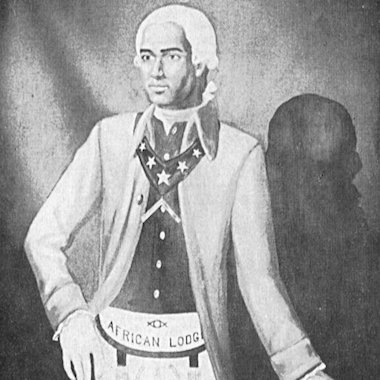Born in Bridgetown, Barbados, Prince Hall ( c. 1735/8–1807) arrived in Boston in 1765 having worked in exchange for passage on a vessel bound for America. Living in colonial Medford, Massachusetts, Hall married Sara Ritchie, an enslaved woman who died soon after the marriage. At age twenty-five, after many years of making a living as a peddler and leather worker, Hall owned land, paid taxes and was eligible to vote. He joined the Continental Army and fought at the Battle of Bunker Hill.
Although free, Hall faced a life of discrimination and oppression. Denied membership in the white Masonic lodges in the new nation—despite its ideals of preaching brotherhood across all races, classes and skills— Hall, along with fourteen other free Black men, joined the Grand Lodge of Ireland, attached to the British forces stationed at Castle William (now Fort Independence) in Boston Harbor in 1775. Although their power within the lodge was limited, this marks the first time men of color were made Masons in America.
When the military lodges left Boston, Hall founded African Lodge #1. Unable to create a charter, Hall petitioned the Grand Lodge in England and was granted a charter in 1784 as African Lodge #459. In 1827, the African Lodge of Freemasons declared itself the African Grand Lodge #1.
An early civil rights activist, Hall continuously challenged the government to stand by its principle of freedom for all. A petition to the General Court as early as 1777 requested that enslaved people be given their freedom and held the government accountable for taking Africans from their homeland. He fought for the abolition of slavery years before the abolitionist movement took root in New England. In his efforts to obtain freedom for the enslaved, Hall is believed to have helped Belinda Sutton with her petition for reparations in 1783.
Prince Hall died in 1807, leaving a legacy as the founder of the first African American institution in America, a champion of education and tireless advocate for the abolition of slavery. In 1847, the African Lodge #1 changed its name to the Prince Hall Grand Lodge in honor of their first Grand Master and founding father of black freemasonry. Hall is buried in Copp’s Hill Burying Ground in Boston, Massachusetts.
Sources: Medford Historical Society, Wikipedia

